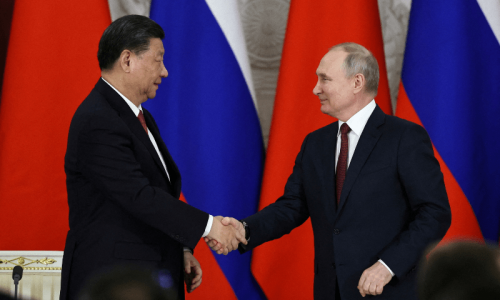WASHINGTON, Sept 5: A key component of national missile defence, whose development is receiving priority this year, is likely to strategically tie the United States to Iraq, Afghanistan and some of the authoritarian former Soviet republics , requiring permanent US military bases there, according to officials and scientists involved in the project.
The attractiveness of boost phase interceptors lies in their ability to shoot down ascending missiles, whose massive heat signature makes them easier targets, before they release their multiple warheads.
Some serious money is beginning to pour in. The development budget is projected to more than quadruple this October - from the current 118 million dollars to 511 million, according to congressional officials.
The growth rate will be almost as impressive in subsequent years: from 1.1 billion dollars in 2006 to 2.2 billion in 2009. Flight testing, say defence officials, is slated for fiscal 2010. But the rocket-like ascent of the programme is prompting some on Capitol Hill to wonder whether efforts to counter the missile threat from Iran will push the United States into questionable strategic alliances - and will add new rationale to the already controversial US military presence in the region.
"It's just that they are throwing huge amounts of money trying to get the technology up and running without thinking clearly about the system they are going to construct," complained Jack Reed, the ranking Democrat of the US Senate Emerging Threats and Capabilities Subcommittee.
"It raises issues of basing it in places like Turkmenistan, Afghanistan, Iraq or the Caspian Sea," the Rhode Island senator said. "And that introduces geopolitical considerations."
While key variables remain unknown, experts agree that if Iran, as expected, produces an intercontinental ballistic missile sometime within the next decade, the United States will not be able to counter it just from ships patrolling the Gulf.
"Discussions are underway with international partners on ways in which they may be able to cooperate," replied a defence official when asked whether the governments of Iraq, Afghanistan and Turkmenistan had already been approached.
The official said the Pentagon was focusing on "a mobile, surface-based, multi-use interceptor," whose design will be "based on mature and proven technologies." But in missile defence speed is of the essence, and the choice of slower interceptors, scientists say, will have to be compensated by location. -AFP











































Dear visitor, the comments section is undergoing an overhaul and will return soon.